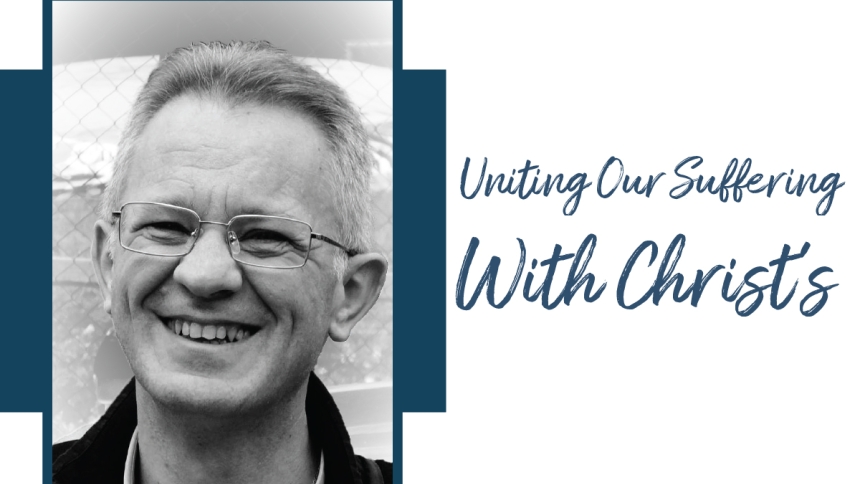
Does pain and suffering have a purpose? Father Domenico Vitulli, a pastor in Rome, Italy, who is battling Parkinson’s, shares how the charism of co-redemptive suffering helps him find purpose and meaning to the physical effects of his disease.
The charism of co-redemptive suffering is when a person unites his/her suffering with Christ’s suffering on the cross. When personal suffering is associated with Christ’s, it becomes an instrument of relief and redemption of one’s neighbor. It allows the person to share in the Paschal Mystery of Resurrection and eternal life.
Life with Parkinson’s
Parkinson’s has taken control of my body and mind. I want to stay still, but I must move; I want to walk, but I am forced to stop; I want to express a thought, but the words elude me. My mind grows sluggish, and I start to doze off, but giving in depresses me. My arm, shoulder, and leg ache at times; my thighs stiffen in the afternoon, and getting out of bed in the morning is laborious, with back pain stabbing me. If I urgently need the bathroom when far from one, it can become embarrassing or even comical.
The other night, at 4 a.m. I opened my eyes wide, assaulted by the thought: “Why this? For how long?” At once, a sword pierced me to a depth I didn’t know I had. I’m unsure whether pain expands the soul or simply opens secret doors I’ve always carried within.
If it weren’t for my faith in God, if I didn’t force my mind into prayer, I’d fall into the driest desolation, left only with the inarticulate cry of someone who feels abandoned by both God and man. I forced myself to think: “Don’t think about the origin, don’t dwell on the future—focus on the purpose, on what it might serve.”
Reflecting on the lives of so many saints, I arrived at an understanding: the children of Fatima, St. Thérèse, Padre Pio—they are all “holocausts of love.”
Offering Pain to Christ
Over every pain, every suffering body, every agonized soul, God has sprinkled the salt of Christ’s blood. Where there are open wounds, his blood enters, the life of the one who, though God, lived through all our pain. This is something I have lived, though I cannot explain it further. Surely, our pain is now shared, understood and embraced by a God who loved us even in his deepest suffering.
Pain is often the first shower of truth for us, washing away fantasies and opening us to relationships with others—to feel accepted, understood, helped. We live in a communion of sin and pain: if we share our burdens with one another, at least we conquer our solitude. If we unite our suffering with Christ’s, we can even hope for a time of freedom and joy with God.
Every day, as a priest, On the altar I ask God the Father to forgive us for the love Jesus had for us. Every day, I ask Jesus that every pain, every anguish, every sleepless night might lift the weight of sin for all.
In the name of all sinners, as one of many, I say to God: “You’ve forgiven me so many times, now forgive us all with that same mercy you showed when you saw my fear of pain. What I’ve learned through pain, grant also to the most fragile who don’t know how to suffer. What you’ve forgiven me through anguish, forgive to all, but alternate anguish with a foretaste of the joy that awaits them.”
Jesus entrusted us, by uniting us to him, with the power to transform our pain into love, and our love into forgiveness for all from God. God suffers when we prevent him from giving himself; he suffers when he isn’t loved; he suffers when we suffer. His joy is forgiveness; more than that, his joy is sharing with the bravest his own pain of loving. These are things the world doesn’t want to hear. Numbed by influencers and enablers, many only turn to increasing their medication. Don’t they know that without pain, there is no love? Don’t they know that without struggle, there is no creation? I now know that those who suffer with God will rejoice with God: that is the address of paradise





